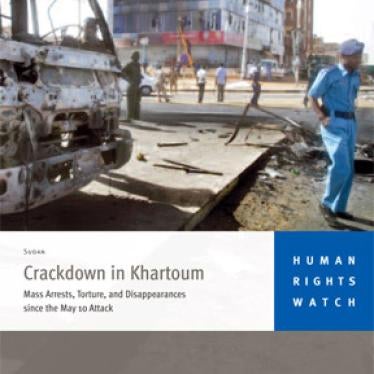(New York) - The Anti-Terrorism Special Courts set up by the government of Sudan to try individuals accused of participating in the May 10, 2008 attack on the capital by a Darfur rebel group do not meet minimum international fair trial standards, Human Rights Watch said today.
On June 18, 2008, the trials of 36 individuals began simultaneously in three Special Courts in Omdurman, Khartoum North, and Khartoum. The Special Courts were created shortly after the May attacks under Sudan’s 2001 Anti-Terrorism Law specifically to try individuals accused of participating in the attack on Omdurman by the rebel Justice and Equality Movement (JEM). Lawyers for some of the 36 defendants told Human Rights Watch that they had limited or no access to their clients and described the court proceeding as arbitrary, forcing some defense lawyers to withdraw. Under Sudanese law, a defendant can be convicted on the basis of a confession made while in incommunicado detention or during coerced interrogations.
“The Sudanese authorities should stop denying defendants their right to a fair trial, otherwise the trials are no more than a show,” said Georgette Gagnon, Africa director at Human Rights Watch. “The authorities should allow the defendants full access to their lawyers.”
The defendants, whom the government alleges are members of JEM, are charged as a group under various articles of the 1991 Penal Code and the 2001 Anti-Terrorism Law, which is being used for the first time after Sudan classified JEM as a terrorist group following the May 10 attack. The charges include armed robbery and violating the “Terrorist Crimes” and “Terrorist Organization” provisions of the 2001 law, which carry the death penalty if convicted. Human Rights Watch opposes capital punishment in all circumstances because of its inherent cruelty.
Human Rights Watch has serious concerns about a defendant’s ability to receive a fair trial within the procedures of the newly established Anti- Terrorism Special Courts. In the Special Court in Khartoum, the judge refused defense lawyers’ access to their clients and assigned the cases to a legal aid lawyer, taking away the defendant’s right to choose a lawyer. Another Special Court procedure removes the defendant’s right against self-incrimination, in violation of international law.
Cases must be appealed to the Anti-Terrorism Appeal Court within seven days of the judgment – hardly sufficient time for an appeal to be brought, especially given the seriousness of the charges. Special Court proceedings cannot be stopped and judgment will be passed, preventing appeals on important legal questions before there is a verdict. The decision of the Appeal Court is final.
“Special courts that cut out basic fair trial rights should be abolished, and the cases should be turned over to the regular courts,” said Gagnon. “The government is just paying lip service to the concept of justice.”
In a June 2008 report, "Crackdown in Khartoum: Mass Arrests, Torture, and Disappearances Since the May 10 Attack,” Human Rights Watch documented a series of human rights violations by the Sudanese security forces in the wake of the JEM attack on May 10. Human Rights Watch obtained the names of more than 200 people who were detained by the authorities, with some former detainees claiming that the total number of people detained might reach as high as 3,000. The fate and whereabouts of the 200 people whom Human Rights Watch has the names of are unknown. Released detainees told Human Rights Watch how state security services tortured and mistreated detainees, who endured inhumane conditions in prisons and secret detention centers.
“Countries genuinely concerned about the situation in Khartoum should be pressing the Sudanese government to account for the whereabouts of all detainees, and promptly charge or release them,” said Gagnon.







